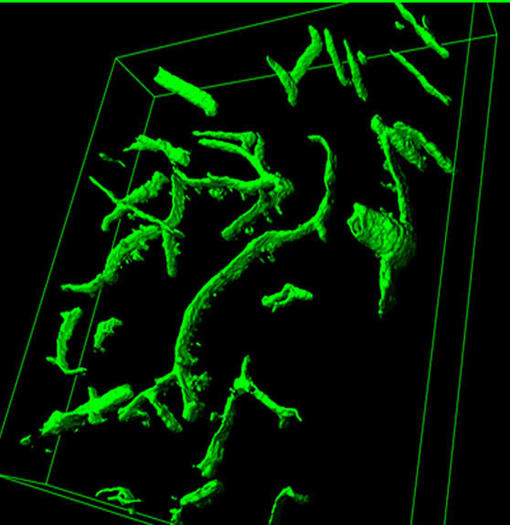http://www.latimes.com/science/scie...cts-of-aging-in-mice-20140502,0,1673071.story

Young blood reverses effects of aging in mice
Can an infusion of young blood reverse the loss of physical and mental ability in old age?
In a group of studies published Sunday in the journals Science and Nature Medicine, researchers say old mice who were infused with the blood of spry younger mice showed clear improvements in memory, sensory function, strength and endurance.
Researchers say a specific protein, found in the blood of mice and humans, appears to be at the root of this rejuvenation. They say they hope to test the protein's effect on humans in clinical trials in the next few years.
"We do think that, at least in principle, there will be a way to reverse some of the decline of aging with a single protein," said Lee Rubin, a professor of stem cell and regenerative biology at Harvard.
It was more than 10 years ago that researchers began to realize that if they surgically conjoined an old mouse and a young mouse -- so that the pair shared the same blood -- the old mice experienced improved stem cell function.
Scientists surmised that there were factors in young mouse blood that were responsible. Subsequent studies showed these factors could also reverse age-related enlargement of the heart and improve the ability of old mice to generate new nerve cells.
Two of the most recent studies focus on a protein known as growth differentiation factor 11, or GDF11, which is abundant in young mice but decreases as they grow older.
In one paper, senior author Rubin and colleagues argued that mice lose mental ability as they age, due to the deterioration of blood vessels. This deterioration results in reduced blood flow, which inhibits the ability of neural stem cells to create new nerve tissue.
This reduction in neurogenesis will, among other things, degrade the mouse's ability to smell. While young mice naturally avoid the strong odor of mint, old mice don't, because they can't detect it as easily.
Study authors hypothesized that if they injected old mice with GDF11, the protein would improve blood flow within the brains of mice by causing new blood vessels to grow. If this were the case, the old mice should get their old sense of smell back, and avoid the mint odor, like younger mice.
The researchers, who used mice with an equivalent human age of roughly 70 years, said this is exactly what happened when they injected them with the protein.
Rubin said it was likely GDF11 had even more widespread effects.
In the other GDF11 study, senior author Amy Wagers, who is also a professor of stem cell and regenerative biology at Harvard, set out with her colleagues to determine if injections of the protein would reverse age-related muscle dysfunction.
When skeletal muscles are damaged, they are repaired by stem cells called satellite cells, which multiply and transform into replacement muscle cells. Aged muscle, however, has fewer satellite cells, and they don't function as well as they do in younger muscle.
Wagers and her colleagues examined satellite cells from older mice and found there was a marked increase in cell DNA damage compared to satellite cells in younger mice.
However, when they surgically conjoined old and young mice so that they shared blood, the satellite cells in the old mice exhibited "restored genomic integrity." Their satellite cell DNA was indistinguishable from the DNA in young mice, the authors wrote.
When the researchers injected old mice with GDF11, the population of satellite cells increased, and the number of satellite cells with severe DNA damage fell by a factor of 4, authors wrote.
The researchers said the older mice who received the protein injections also showed increased strength and exercise endurance.
These findings, along with those of other studies, suggest that "GDF11 should be regarded as a new molecular regulator of mammalian aging with potentially broad-reaching applications," the study authors wrote.
In the third study, researchers injected old mice with the blood plasma of young mice and observed the effects on memory.
Young blood reverses effects of aging in mice
Can an infusion of young blood reverse the loss of physical and mental ability in old age?
In a group of studies published Sunday in the journals Science and Nature Medicine, researchers say old mice who were infused with the blood of spry younger mice showed clear improvements in memory, sensory function, strength and endurance.
Researchers say a specific protein, found in the blood of mice and humans, appears to be at the root of this rejuvenation. They say they hope to test the protein's effect on humans in clinical trials in the next few years.
"We do think that, at least in principle, there will be a way to reverse some of the decline of aging with a single protein," said Lee Rubin, a professor of stem cell and regenerative biology at Harvard.
It was more than 10 years ago that researchers began to realize that if they surgically conjoined an old mouse and a young mouse -- so that the pair shared the same blood -- the old mice experienced improved stem cell function.
Scientists surmised that there were factors in young mouse blood that were responsible. Subsequent studies showed these factors could also reverse age-related enlargement of the heart and improve the ability of old mice to generate new nerve cells.
Two of the most recent studies focus on a protein known as growth differentiation factor 11, or GDF11, which is abundant in young mice but decreases as they grow older.
In one paper, senior author Rubin and colleagues argued that mice lose mental ability as they age, due to the deterioration of blood vessels. This deterioration results in reduced blood flow, which inhibits the ability of neural stem cells to create new nerve tissue.
This reduction in neurogenesis will, among other things, degrade the mouse's ability to smell. While young mice naturally avoid the strong odor of mint, old mice don't, because they can't detect it as easily.
Study authors hypothesized that if they injected old mice with GDF11, the protein would improve blood flow within the brains of mice by causing new blood vessels to grow. If this were the case, the old mice should get their old sense of smell back, and avoid the mint odor, like younger mice.
The researchers, who used mice with an equivalent human age of roughly 70 years, said this is exactly what happened when they injected them with the protein.
Rubin said it was likely GDF11 had even more widespread effects.
In the other GDF11 study, senior author Amy Wagers, who is also a professor of stem cell and regenerative biology at Harvard, set out with her colleagues to determine if injections of the protein would reverse age-related muscle dysfunction.
When skeletal muscles are damaged, they are repaired by stem cells called satellite cells, which multiply and transform into replacement muscle cells. Aged muscle, however, has fewer satellite cells, and they don't function as well as they do in younger muscle.
Wagers and her colleagues examined satellite cells from older mice and found there was a marked increase in cell DNA damage compared to satellite cells in younger mice.
However, when they surgically conjoined old and young mice so that they shared blood, the satellite cells in the old mice exhibited "restored genomic integrity." Their satellite cell DNA was indistinguishable from the DNA in young mice, the authors wrote.
When the researchers injected old mice with GDF11, the population of satellite cells increased, and the number of satellite cells with severe DNA damage fell by a factor of 4, authors wrote.
The researchers said the older mice who received the protein injections also showed increased strength and exercise endurance.
These findings, along with those of other studies, suggest that "GDF11 should be regarded as a new molecular regulator of mammalian aging with potentially broad-reaching applications," the study authors wrote.
In the third study, researchers injected old mice with the blood plasma of young mice and observed the effects on memory.






